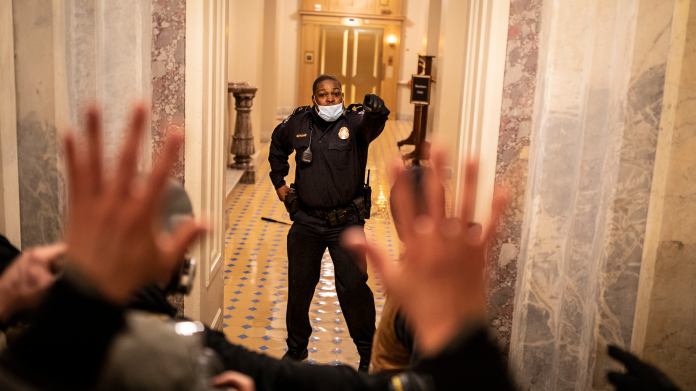Editor’s Note: This article is part of “If Trump Wins,” a project considering what Donald Trump might do if reelected in 2024.
Like many reporters, I’ve been operating in Casaubon mode for much of the past eight years, searching for the key to Donald Trump’s mythologies. No single explanation of Trump is fully satisfactory, although Atlantic staff writer Adam Serwer came closest when he observed that the cruelty is the point. Another person who helped me unscramble the mystery of Trump was his son-in-law Jared Kushner. Early in the Trump presidency, I had lunch with Kushner in his White House office. We were meant to be discussing Middle East peace (more on that another time), but I was particularly curious to hear Kushner talk about his father-in-law’s behavior. I was not inured then—and am not inured even now—to the many rococo manifestations of Trump’s defective character. One of the first moments of real shock for me came in the summer of 2015, when Trump, then an implausible candidate for the Republican presidential nomination, said of Senator John McCain, “He’s not a war hero … I like people who weren’t captured, okay?”
I did not understand how so many ostensibly patriotic voters could subsequently embrace Trump, but mainly I couldn’t understand his soul sickness: How does a person come to such a rotten, depraved thought?
That day in the White House, I mentioned to Kushner one of Trump’s more recent calumnies and told him that, in my view, his father-in-law’s incivility was damaging the country. Strangely, Kushner seemed to agree with me: “No one can go as low as the president,” he said. “You shouldn’t even try.”
I was confused at first. But then I understood: Kushner wasn’t insulting his father-in-law. He was paying him a compliment.
Perverse, of course. But revelatory as well, and more than a little prophetic. Because Trump, in the intervening years, has gone lower, and lower, and lower. If there is a bottom—no sure thing—he’s getting closer. Tom Nichols, who writes The Atlantic’s daily newsletter and is one of our in-house experts on authoritarianism, argued in mid-November that Trump has finally earned the epithet “fascist.”
“For weeks, Trump has been ramping up his rhetoric,” Nichols wrote. “Early last month, he echoed the vile and obsessively germophobic language of Adolf Hitler by describing immigrants as disease-ridden terrorists and psychiatric patients who are ‘poisoning the blood of our country.’ ” In a separate speech, Trump, Nichols wrote, “melded religious and political rhetoric to aim not at foreign nations or immigrants, but at his fellow citizens. This is when he crossed one of the last remaining lines that separated his usual authoritarian bluster from recognizable fascism.”
Trump’s rhetoric has numbed us in its hyperbole and frequency. As David A. Graham, one of our magazine’s chroniclers of the Trump era, wrote recently, “The former president continues to produce substantive ideas—which is not to say they are wise or prudent, but they are certainly more than gibberish. In fact, much of what Trump is discussing is un-American, not merely in the sense of being antithetical to some imagined national set of mores, but in that his ideas contravene basic principles of the Constitution or other bedrock bases of American government.”
[David A. Graham: Trump isn’t merely unhinged]
There was a time when it seemed impossible to imagine that Trump would once again be a candidate for president. That moment lasted from the night of January 6, 2021, until the afternoon of January 28, 2021, when the then-leader of the House Republican caucus, Kevin McCarthy, visited Trump at Mar-a-Lago and welcomed him back into the fold.
And so here we are. It is not a sure thing that Trump will win the Republican nomination again, but as I write this, he’s the prohibitive front-runner. Which is why we felt it necessary to share with our readers our collective understanding of what could take place in a second Trump term. I encourage you to read all of the articles in this special issue carefully (though perhaps not in one sitting, for reasons of mental hygiene). Our team of brilliant writers makes a convincingly dispositive case that both Trump and Trumpism pose an existential threat to America and to the ideas that animate it. The country survived the first Trump term, though not without sustaining serious damage. A second term, if there is one, will be much worse.
The Atlantic, as our loyal readers know, is deliberately not a partisan magazine. “Of no party or clique” is our original 1857 motto, and it is true today. Our concern with Trump is not that he is a Republican, or that he embraces—when convenient—certain conservative ideas. We believe that a democracy needs, among other things, a strong liberal party and a strong conservative party in order to flourish. Our concern is that the Republican Party has mortgaged itself to an antidemocratic demagogue, one who is completely devoid of decency.
This editor’s note appears in the January/February 2024 print edition with the headline “A Warning.”

















